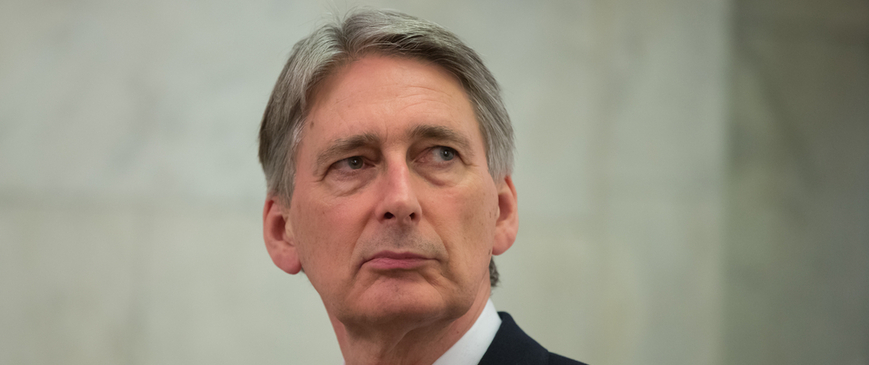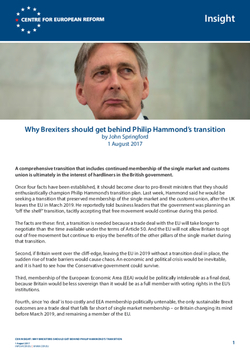
Why Brexiters should get behind Philip Hammond's transition
A comprehensive transition that includes continued membership of the single market and customs union is ultimately in the interest of hardliners in the British government.
Once four facts have been established, it should become clear to pro-Brexit ministers that they should enthusiastically champion Philip Hammond’s transition plan. Last week, Hammond said he would be seeking a transition that preserved membership of the single market and the customs union, after the UK leaves the EU in March 2019. He reportedly told business leaders that the government was planning an “off the shelf” transition, tacitly accepting that free movement would continue during this period.
The facts are these: first, a transition is needed because a trade deal with the EU will take longer to negotiate than the time available under the terms of Article 50. And the EU will not allow Britain to opt out of free movement but continue to enjoy the benefits of the other pillars of the single market during that transition.
Second, if Britain went over the cliff-edge, leaving the EU in 2019 without a transition deal in place, the sudden rise of trade barriers would cause chaos. An economic and political crisis would be inevitable, and it is hard to see how the Conservative government could survive.
Third, membership of the European Economic Area (EEA) would be politically intolerable as a final deal, because Britain would be less sovereign than it would be as a full member with voting rights in the EU’s institutions.
Fourth, since ‘no deal’ is too costly and EEA membership politically untenable, the only sustainable Brexit outcomes are a trade deal that falls far short of single market membership – or Britain changing its mind before March 2019, and remaining a member of the EU.
#PhilipHammond’s transition plan would spread #UK economic pain over a number of years
Hammond’s transition plan would spread the economic pain over a number of years, avoiding a crisis that might lead the electorate to change their mind about Brexit altogether. Banks would not have to trigger their contingency plans for no deal and move operations dependent on EU law to the EU-27 in early 2018. The government would have more time to build the infrastructure at Britain’s ports needed to cope with leaving the customs union, and to establish the IT systems and ID cards needed for a post-free movement migration regime. Continued free movement would raise output after 2019, as increasing the number of people in work in Britain mechanically raises GDP. Brexiters would be able to say that Project Fear was exaggerated, and that the road to Brexit was bumpy but bearable.
A comprehensive transition, therefore, is in Brexiter ministers’ interests: it raises the chances that Britain will leave the EU in an orderly way. But it is not yet clear whether cabinet hardliners will accept it – trade secretary Liam Fox has already said he is opposed to continued free movement in a transition, and Boris Johnson’s former economic advisor Gerard Lyons has attacked Hammond’s transition plan in The Sunday Telegraph. Why are they not endorsing Hammond’s plan?
There are several possibilities. Many Conservatives think that David Cameron was not confrontational enough with the EU in his renegotiation, arguing that the EU would have given Britain opt-outs from free movement if they believed that Cameron was serious about endorsing Leave. They see the Brexit negotiations in a similar light, and say that the UK has several cards to play: security co-operation, the money owed for past commitments to the EU budget, and the EU’s trade surplus with the UK. To their mind, making no deal a credible threat will win concessions. But the UK would bear most of the economic costs of no deal, because half of its trade is conducted with the EU, while around one-sixth of the EU-27’s trade is conducted with Britain. The EU therefore has the upper hand in the negotiations.
Brexiters also fear that Britain might get stuck in the transition arrangement, which could then provide time for pro-EU forces, perhaps under a pro-European Labour leader like the London mayor Sadiq Khan, to push for ‘Bre-entry’. But once Britain has left the EU in March 2019, the likelihood that it will re-join is slim. The country would have to go through another accession process, and its opt-outs from the euro, Schengen and justice and home affairs policies – and the budget rebate – might no longer be available. The UK is unlikely to get stuck in the transition: the EU, like the Brexiters, want a strictly time-limited arrangement.
If Brexiters understood #Britain’s predicament, they would realise that Hammond is their ally
Membership of the customs union during the transition would mean that Liam Fox could not quickly negotiate a trade deal with the US, and membership of the single market would delay the repatriation of regulatory powers. Control over trade policy and regulation has been one of the Leave elite’s main aims; they are not, by and large, hostile to immigration. But if they severely damage the economy by making a sudden break with the EU, they risk being kicked out of office by an angry electorate, and would therefore be unable to restructure the British economy along US lines in any case.
Finally, by accepting a comprehensive transition, Brexiters would be tacitly admitting that leaving the single market posed major challenges. And by insisting that there could be no bonfire of regulations and tax cuts during the transitional phase, Philip Hammond has this week undermined the argument that Brexit would be an easy-to-achieve liberation. By accepting these propositions, Brexiters risk emboldening those arguing that the Article 50 letter should be revoked.
But the faltering economy poses the biggest challenge to the cabinet hardliners, because it might lead the electorate to change its mind before Britain leaves the EU in 2019. If they understood Britain’s predicament, they would realise that Hammond is their ally, not their foe.
John Springford is director of research at the Centre for European Reform.


Comments
Add new comment